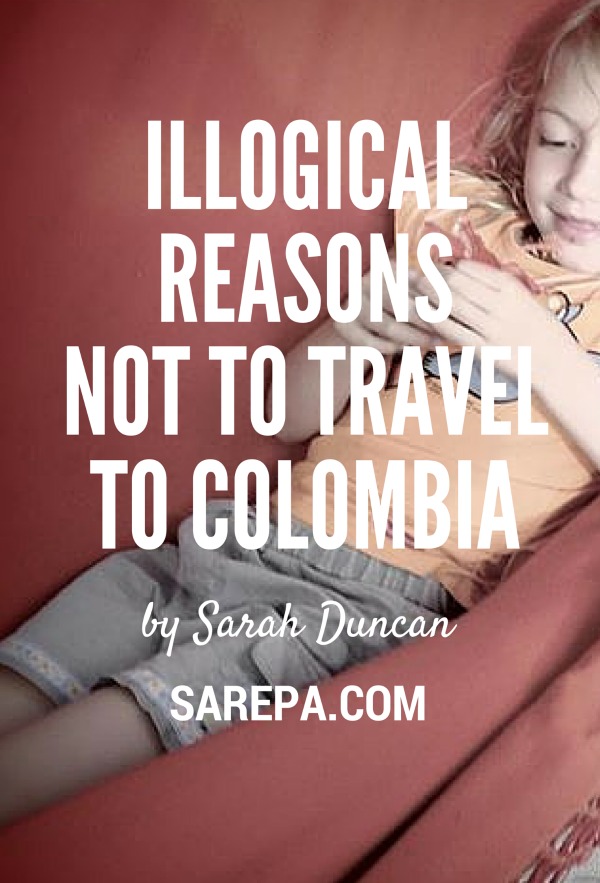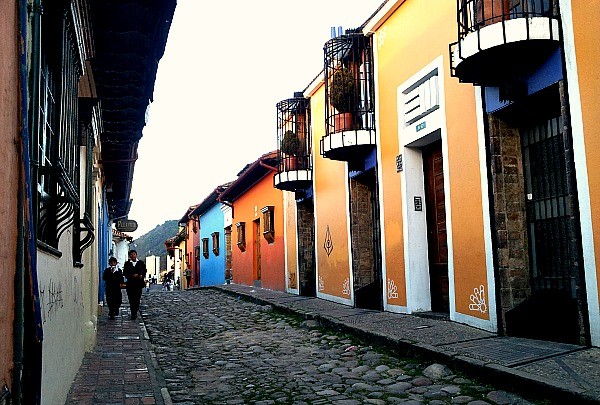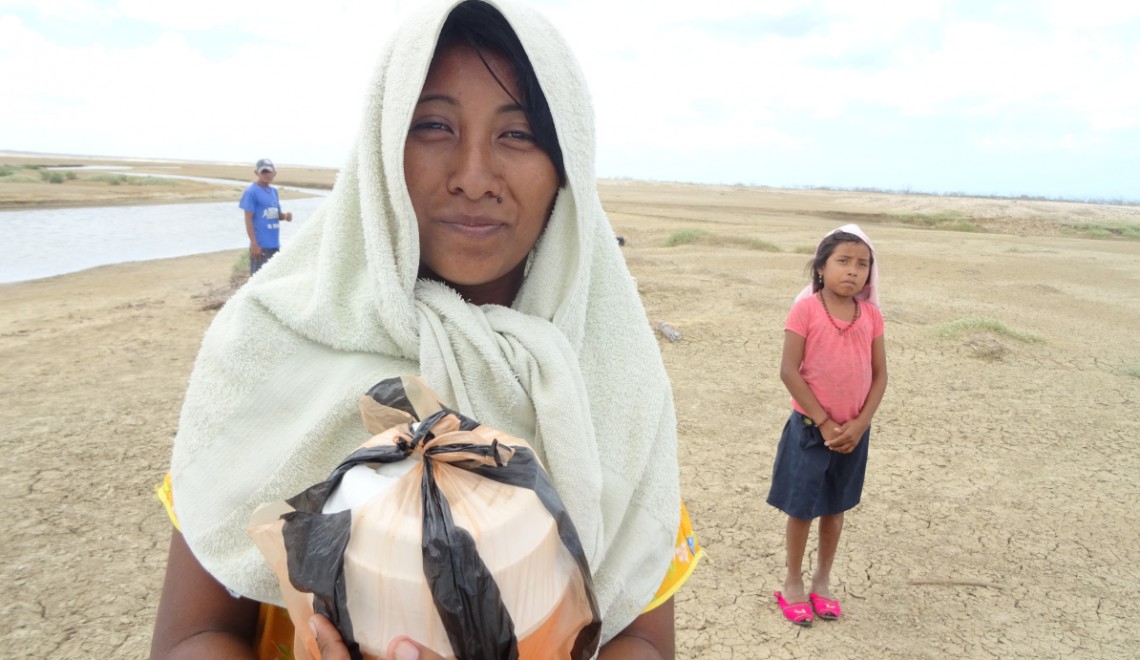
The Colombian export commission and tourism board, ProExport, created an entire campaign around the fear of travelling to Colombia. “The only risk is wanting to stay” the catchphrase charmed. The campaign featured some of Colombia’s favourite sports stars, musical talents and literary greats, including Camilo Villegas, Shakira and Gabriel Garcia Marquez – showcasing Colombia as welcoming, cultured, beautiful.
When I find myself in conversation about Colombia travel, I’m often, but not always, met with questions about the risks.
Is it dangerous?
Will I get kidnapped?
You know the questions I mean.
But are tourists and travellers right to take Colombia off their must-see countries list because of these concerns? I say no, absolutely not.
I can only go by my own experiences in Colombia – what I’ve seen and heard firsthand – and what I’ve learned about the country along the way, but here are my six completely illogical reasons not to travel Colombia.

1. It’s unsafe
Safety in Colombia always comes up as an issue when foreigners think about paying the country a visit; and while the country does have a past full of instances of civil war and unrest, I don’t see that as enough reason to stay away. Colombia is taking its bit of the tourism pie and with that, hopefully, comes money, infrastructure, and development. Just take a look at Medellin to see how far one city has come from a dangerous pit of unrest to a tourism capital.

2. I might get kidnapped
If you’re ready to take Colombia off your itinerary because of kidnappings, then you’d better take Malaysia, India and Mexico off your list, too. According to the Ministry of Defense of Colombia, the amount of annual kidnappings has dropped from 2,882 in 2002 to 282 in 2010. Whereas, according to Vocativ, just last year “almost 1,583 kidnapping cases were reported to Mexican authorities—the highest number since Mexico began tracking kidnapping stats in 1997.”

3. I don’t speak Spanish
Lucky for you then because, in certain area of the country, Colombians are known to speak the easiest Spanish accent to understand. Tom Stockwell, from travel blog Waegook Tom says you don’t even need to know Spanish to travel Colombia. “Travelling around the country for one month, I didn’t really need an extensive vocabulary,” he says. “You don’t need to know the language of a place in order to go there.”

4. The political unrest
I really couldn’t have said it better than journalist Richard McColl who wrote a piece in response to tourists who took part in reckless activities in the country. “There are times when I wonder why we promote Colombia if the country is a destination for not only the intrepid and educated but also for the plain stupid,” McColl said of two people who had gone missing after embarking on dangerous “treks” in politically heated areas of the country. You can read more about the tourists’ misadventures here. The moral of the story? There is political unrest in the country, just don’t be stupid enough to find yourself mixed up in it.

Street Vendor in Colombia
5. I won’t be able to find a job
Unemployment rates are on the decline in Colombia and “have decreased by 1.1% in February compared to the same month last year” according to the National Administrative Department of Statistics.
In Chris Allbritton’s controversial article 10 Things I Hate About Bogota, he is quick to condemn Bogota as “a black hole, work-wise.”
“There just isn’t a lot of work in Bogotá for extrañeros [sic],” he says.
But I say it comes down to knowledge; if you have knowledge of the language or the culture, more opportunities will be available to you. For those who don’t have fluent Spanish on their side, there’s also English teaching, bar tending and the odd acting role to take advantage of.

6. There’s no innovation or development
In 2011 the BBC called Colombia “the least well-developed culture of innovation and entrepreneurship” on their list of 24 most entrepreneur-friendly nations.
“Of the polled citizens, Colombians are particularly pessimistic about how innovation and creativity are valued in the country. 46% of the respondents strongly disagreed with the statement that this was valued, while 20% somewhat disagreed,” Colombia Reports wrote of the BBC article.
Earlier this year, just three years on, the BBC reported on the dramatic changes the country and the economy faced.
In their piece “Latin America catches entrepreneurship fever” Gideon Long wrote about how Colombia and its neighbouring countries have embraced business, extending far beyond their bread and butter in raw materials.
“Until recently, entrepreneurship in Peru was a question of survival,” says Gary Urteaga, a Peruvian tech entrepreneur.
“People started their own businesses because they couldn’t get a job. They’d sell sandwiches in the streets and wash cars. But now, for the first time, people are choosing to be entrepreneurs.”
The same is happening in Colombia. A medical start-up called Keraderm has won state funding to develop a new technology for skin grafts.
“Looking at a country like Colombia, which had several problems in terms of violence and security and all that, we have changed a lot in the past 10 years,” says Jorge Soto, Keraderm’s chief executive.
“Now, developed countries are going to have to start looking at us as a source of new ideas and new companies.”
If safety, kidnappings, work opportunity or you’re less-than perfect language skills are stopping you from travelling Colombia, then I urge you to think again.
Pin this post and save it for later!

What do you think? Is Colombia on your list of countries to visit? Or have you visited Colombia already? Let me know in the comments below.







Hello,
Just want to pinpoint a little spelling mistake, the word is “extranjeros” not extrañeros, unless that is a new word I’m not aware of yet.
Colombia still has a lot of work to do, we are stuck in old ways and it seems to me there’s still loads of people afraid of change, we are a society still very much divided by class and could even venture to say still a bit racist. I think we still lack that sense of community, we are very aware of the problems the country has but we are still to take full responsibility of it and actually get together and do something about it, we are in some waiting for someone else to come and sort all of our problems while in the meantime we continue to complain about.
Still I feel very proud of being Colombian and how far we have come in the past 10 or so years. It’s incredible to meet people that have travelled to Colombia and have come back to tell wonderful stories of their time there and how much they loved the country and their people!
Thanks so much for pointing that out Catalina and for reading and sharing. We all have our problems, including our countries, but there’s so much good going on in Colombia, too. We so frequently hear about the not so great that occurs, so I prefer to share what good I experienced. Colombia has given me a lot over the years, I feel it only fair to return the favour. 🙂
Hi Sarepa good to see, read and be reminded with your rational point of view on Colombia the country and the people who live there, prompting readers to to walk through your list of initial concerns that a tourist or traveller may have before they go to Colombia (or any other region in the world that has a past no more worse than the UK the only difference being time past, and transcended sometimes by better things as is Colombia today 2014)
I like you Sarepa have had the adventure, a really good and happy one too, of travelling Colombia, my first one was 33 years ago, in a car all the way from Bogota, through Medellin, Cali, Popyan, Pasto, Tulcan, and on through Ecuador to Quito, Quacquil, and down to the coast Salinas and then back again many months and many experiences, was it dangerous, scarey, NO, if there were moments they only lasted until one day it dawned on me (When in Rome do as the Romans do) forget your watch, forget the incessant plans we make, don’t be driven by time and needless concern such as watch out for the Bandidos there everywhere, you may well find, like I did, the Bandidos live more in your head and other well intentioned advisors heads than they do in in reality in Colombia today, of course ones view is not helped by shoddy, cheap journalism, your comments are what’s needed no overblown drama,s, just rational food for thought respecting the emotional intelligence of the tourist and traveller today
Of course be prudent but please don’t allow unjustified fear or concern stop you from a beautiful and rewarding experience such as Colombia.
I have been back to Colombia 14 times over the years for some extended time periods.
Once I was lost with some friends and I seen some Colombian policemen and asked them the way, then we started talking, they were so interested in us foreigners and how we were enjoying our time in Colombia the next thing I recall was that we erected our tent (we both camped and stayed in hotels when we wanted to) in the police station car park, started a party with the police, all got absolutely drunk on Aquadiente (national Colombian drink) then at about 3 in the morning the Captain of the police turned up because people in the village called him to tell him there was a lot of shouting going on, anyway an hour or more later me and the Captain were swinging arm in arm around around the police station floor to the paisa music singing our heads off. I don,t think this would be allowed or happen in the Uk anyway the following day the police insisted we have breakfast with them and then took us to the start of the direction for our next journey.
I am 60 now, we purchased a small farm 7 years ago in Colombia, near Medellin, a place near a small town named Barbosa, Antioquia we are moving from the UK my country of birth a wonderful country by any standard) to Colombia and this farm in August 2014
I tell you this the Colombian people are very friendly and warm, they are open, passionate, outgoing and so deeply kind it will make you question at times what have you been doing with your life, these people do not have it easy by any means life can be so tough for some, but they have a secret they can share with you, if you can just be open minded enough to hear it, go there and see for yourself, don’t just stay in the tourist areas, if your can meet some locals, use your common sense, and take a little risk, Colombian people do seem to know how to take and live each day as it comes.
Some major parts Colombia are ultra modern cities, with all modern conveniences and many parts of Colombia allow you to step back in time to incredibly romantic and emotionally moving places, don,t delay my friend it will not last forever, in 30 odd years I have myself seen necessary changes many needed and for the betterment of all, some times are lost and gone, go now and you will not regret it a great country to visit and who knows maybe?
Wow, Stephen! Thank you so much for sharing your experiences. I am sure you have a tonne of stories to tell! Enjoy your time on the farm, I would love to hear how you go. Keep in touch.
I think every country have problems, but as a Latin American I can say Colombia is one of the safest countries to travel in South America. You can go to popular cities as Cartagena (which is beautiful and yes, full of tourists) or little towns where people is even nicer. Of course you have to be careful, but really, where can you be a tourist and not be careful of your belongings? I think kidnaps are in Colombia’s past, and I felt totally safe at the streets after midnight. Besides, police man where everywhere and very helpful! It helps to stick to the tourist/bigger cities if you really don’t know any Spanish. I’m not Colombian, but I fell in love with a Colombian and I’d love to live there (We are thinking about it). We were recently in Cartagena, Sincelejo, Corozal & San Andres, and my experience was like that commercial, the only risk for me was wanting to stay! I wanted to stay!
BTW, I think you mean ‘extranjeros’.
As someone born in Bogota and now living in NYC, I tend to be greeted with eyebrow raises and blank stares when I say I’m traveling to Colombia. Even my parents–who were born and raised in Colombia–haven’t been back to the country since the 80s and are convinced it is just as dangerous now as it was back then.
There is such a sad misconception of this beautiful country and I like how you addressed each of them in a well researched response!
It’s really a great and useful piece of info.
I am glad that you shared this helpful info with us.
Please stay us up to date like this. Thanks for sharing.
Great article Sarah! Love your blogs! If you allow me, I´d like to offer my opinion on Bogota travel. When visiting Bogota, DO NOT stay in La Candelaria where most hostals are located. I being Colombian find it VERY IRONIC that most foreigners stay in La Candelaria.There are many nice neighborhoods to stay in that feel a lot safer at night. DO NOT stay in the center or South of the city, The center/La Candelaria is an interesting area to visit during the day, cultural events, bohemian, etc. I spend a lot of time there for events but it gets dodgy/sketchy late at night. At night, many junkies from the crime pockets start wandering into the center of the city. I often see clean-looking Colombians rushing to get out of La Candelaria late at night to avoid getting robbed while foreigners who stick-out like sore thumbs are staying there. What the hell!? As I mentioned, there are many nice neighborhoods to stay in. Try Airbnb, etc. Colombians are extremely friendly and will give you tips about places to visit, there are also beautiful suburban/country-side areas outside of Bogota that many Bogota-residents frequent. Go to language exchange groups and get info from locals, but don´t stay in La Candelaria. I am a local and I´m telling you this with all honesty, I´m just trying to save some face and doing what I can so that people visitng my country enjoy it, so stop staying in the dodgiest areas of the city you crazy tourists! Also, I´ve been showing foreigners around the city and taking them to gorgeous natural areas and smaller towns outside of the city as a part-time gig that is more of a hobby to me. I do this at an extremely economic rate where you get a personalized tour with me and my sister which is way, way more affordable than what a tour company would charge. I lived in the United States but returned to Colombia recently, it is definitely a country worth visiting, there are awesome places to see, it is a very diverse country and it is a shame that many people who come visit miss-out on many incredible locations and events just due to lack of information. If you would like any tips on your visit to Colombia, I´ll be glad to offer my feedback even if you´re not interested in having me show you around. I can be contacted at: ad_hhe@yahoo.com My name is Andres Duran,
You are a wealth of information, thanks Duran!